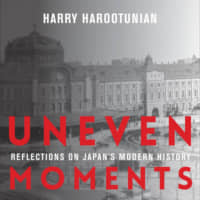Over the past four decades, the work of Harry Harootunian has played a critical role in Japanese studies.
Uneven Moments: Reflections on Japan's Modern History, by Harry Harootunian.
384 pages
COLUMBIA UNIVERSITY PRESS, History.
This volume collects essays that span his career and situate Japan's modern intellectual history within a larger theoretical framework, bringing Japanese thinkers into analyses often dominated by a Eurocentric focus. Jun Tosaka is read alongside Karl Polanyi; Kunio Yanagita with Hegel and Walter Benjamin, giving the reader a fuller sense of the global scope of the displacements created by the transition to modernity. This is less about provincializing Europe than insisting upon a shared experience of the shock of the modern.
Harootunian's work reflects a long-standing interest in the uses and misuses of history, from his critiques of the Cold War formulation of area studies as a way to "know your enemy" to his recent investigations into the political meanings and problems posed by the postwar retention of the Emperor. The title of this collection, "Uneven Moments," points to how he sees "uneven and mixed temporalities" exist in our present, an unevenness and mixture that he understands as the product of capitalist modernity.
The writing is dense, engaging with an impressive range of intellectual debates: late Tokugawa nativism, the Kyoto School of philosophy, Koza-ha Marxism, modernization theory and postcolonialism. But, for readers interested in the complex relationship between culture and politics in Japan and elsewhere, this is essential reading.


















With your current subscription plan you can comment on stories. However, before writing your first comment, please create a display name in the Profile section of your subscriber account page.